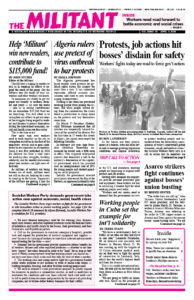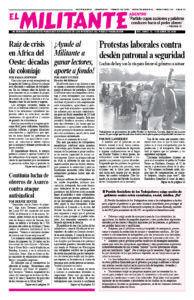“We have a revolutionary duty to fulfill, so we take our fear and put it to one side,” Leonardo Fernández, 68, an intensive care specialist, told Reuters in Havana March 21. He was meeting up with the brigade of 52 Cuban volunteer medical workers on their way to fight the spread of coronavirus in Lombardy, Italy, which has the world’s highest death toll from the disease.
This is his eighth international mission. He took part in the battle to push back Ebola in Liberia in West Africa in 2014.
“We are going to fulfill an honorable task, based on the principle of solidarity,” fellow doctor Graciliano Díaz told Reuters.
Such working-class internationalism has been a hallmark of the Cuban Revolution since workers and farmers, led by Fidel Castro and the Rebel Army, overthrew the U.S.-backed Batista dictatorship in 1959 and went on to take power into their own hands. During the revolutionary war they established clinics and field hospitals in areas they controlled, treating rebel soldiers, but also enemy combatants as well as local peasants, many getting medical care for the first time.
Working people gained confidence in their own capacities to resolve what at times seemed like insurmountable problems as they began running society.
In recent days the government has also sent medical brigades to combat coronavirus in Grenada, Jamaica, Nicaragua, Suriname and Venezuela, boosting the more than 28,000 medical volunteers it has serving in 61 countries around the world.
“We are not slaves, we are going voluntarily to offer our solidarity, to heal those who need it anywhere in the world,” Eduardo Ropero Poveda, coordinator of the brigade heading to Jamaica, told Juventud Rebelde.
Ropero was referring to lies perpetrated by Washington that the Cuban medical volunteers are “held in servitude.” The U.S. rulers use such slanders to advance their six-decades-long economic war aimed at overthrowing Cuba’s revolutionary government.
Government looks to working people
The government’s response to the worldwide spread of the virus is consistent with the steps to minimize the impact of the disease in Cuba. It looks to the creativity and capacities of the country’s working people to combat natural disasters and meet other challenges.
Nearly 65,000 workplace meetings involving some 2.5 million workers have already taken place since March 9, organized by the Central Organization of Cuban Workers (CTC), to discuss the prevention of coronavirus.
Garment shops all over the country have switched over to production of thousands of face masks every day.
The government has mobilized 28,000 medical students to visit people at their homes nationwide. They rapidly received training to safely screen and isolate individuals who might have the disease, and then inform family doctors who make sure those infected get treatment.
Each student is expected to visit 80 houses a day. More than a million people had been visited by March 20, reported Prensa Latina.
“We’re taking every precaution to protect the medical students involved,” Jorge González Pérez, national director for Medical Studies at the Cuban Ministry of Public Health, told Radio Havana. “The aim is for the early detection and diagnosis of any possible cases of COVID-19.”
Susanne Santiesteban, a third-year medical student, knocked on the door of an elderly resident of Manzanillo in the southeastern part of the island, Juventud Rebelde reported. When she asked if he or his family had any symptoms, he told her they were well and “ready for the fight.” As she was leaving he called out, “Today the revolution came to my house. That’s why I will defend it until I die!”
On March 23, the Cuban government announced new measures, including suspending school for four weeks; closing dance clubs, pools and gyms; giving special attention to senior citizens who live at home or who live alone; increasing food production; and ending most travel between cities. All Cubans returning to the island are quarantined for 14 days and tourists can no longer enter the country. Restaurants must cut their seating in half.
To make sure that everyone is well-informed of what to do, the mass organizations together with local governments organize visits to every home in the country.

